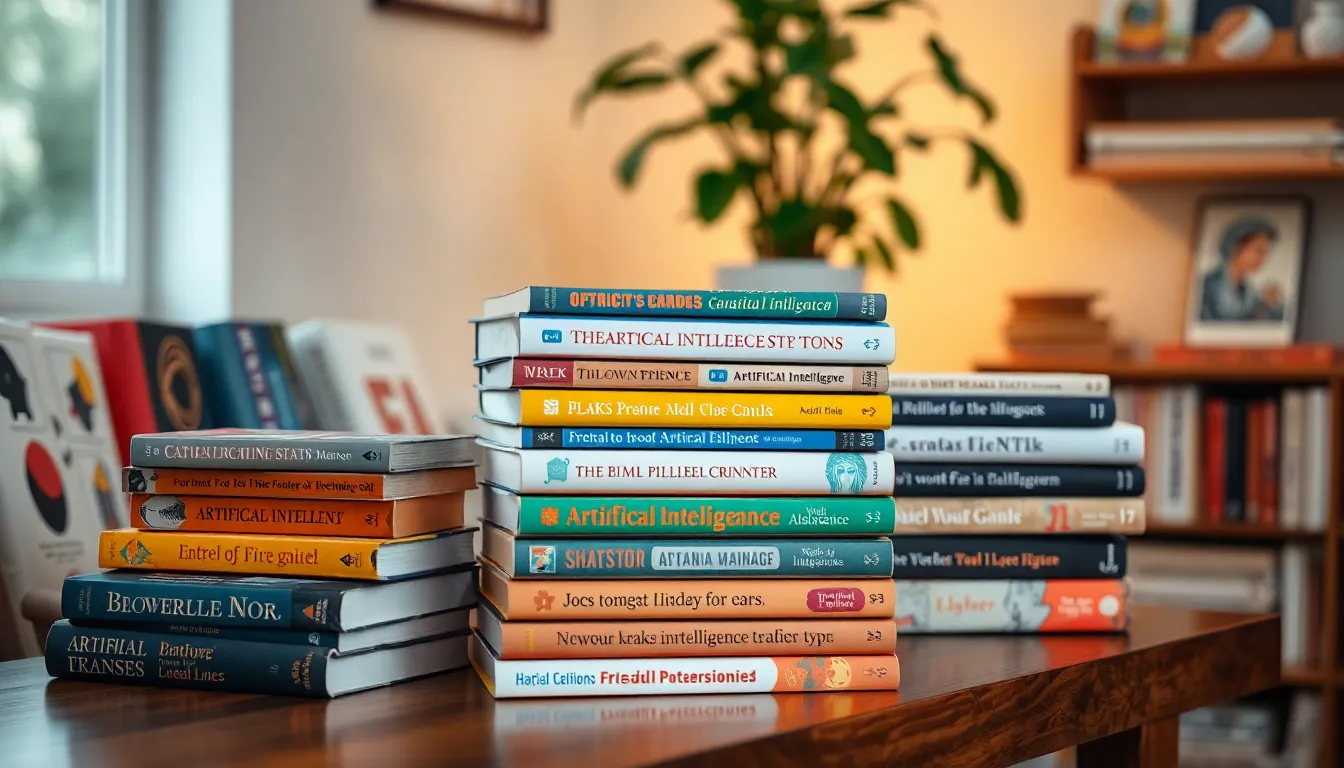Table of Contents
ToggleIn a world where machines might soon outsmart their creators, the fascination with artificial intelligence has never been stronger. Books about AI are popping up like popcorn in a microwave, each one offering a unique take on what our robot overlords might have in store for us. Whether it’s a thrilling sci-fi adventure or a deep dive into the ethics of machine learning, these reads promise to tickle the intellect while keeping readers on the edge of their seats.
Imagine curling up with a good book that not only entertains but also enlightens. From cautionary tales warning against the rise of the machines to visionary insights that inspire innovation, the right book can transform how one thinks about technology. So grab a cup of coffee, settle in, and prepare to explore the literary landscape of artificial intelligence—where the pages are filled with both wonder and a hint of existential dread.
Overview of Artificial Intelligence Literature
Artificial intelligence literature covers a wide array of themes and ideas. Readers discover thrilling sci-fi narratives that imagine a future dominated by intelligent machines. Many authors explore the ethical dilemmas that arise from advanced machine learning, prompting reflections on human values.
Books such as “Superintelligence” by Nick Bostrom examine the potential risks of AI surpassing human intelligence. Academic texts delve into technical aspects, like algorithms and neural networks, providing valuable insights into the mechanics of AI. Fictional works, including “Neuromancer” by William Gibson, blend technology with cultural commentary, highlighting how AI influences human lives.
Discussions around AI ethics appear frequently in literature. Titles like “Weapons of Math Destruction” by Cathy O’Neil critique how algorithms can perpetuate social injustices. The duality of AI as both a tool and a threat is a common theme, allowing readers to engage with complex ideas.
Books also highlight the societal impacts of AI, such as job displacement and privacy concerns. “Race After Technology” by Ruha Benjamin discusses how technological advancements might reinforce systemic biases. Through these narratives, literature fosters a deeper understanding of AI’s role in shaping present and future societies.
Readers gain both entertainment and intellectual stimulation from these works. Engaging with varied perspectives enhances awareness about AI’s capabilities and challenges. The growing interest in this literary genre reflects a collective fascination with the future of technology.
Recommended Books About Artificial Intelligence

Various books delve into artificial intelligence, offering insights and narratives that captivate readers. Below are some noteworthy titles worth exploring.
Classic Works in AI
Renowned classics in artificial intelligence literature present foundational concepts and theories. “Mind Children” by Hans Moravec discusses the future of human intelligence alongside machines. “The Age of Intelligent Machines” by Ray Kurzweil forecasts advancements in AI and its societal implications. “Computing Machinery and Intelligence” by Alan Turing introduces the iconic Turing Test, sparking debates about machine cognition. Each of these influential works continues to shape discussions around AI, providing essential perspectives that educate and provoke thought.
Contemporary Bestsellers
Modern bestsellers in AI literature reflect current trends and ethical dilemmas. “Life 3.0” by Max Tegmark explores the future of AI and its impact on society, debating potential outcomes. “The AI Advantage” by Thomas H. Davenport emphasizes how businesses leverage AI technologies for competitive gain. “Artificial Intelligence: A Guide to Intelligent Systems” by Michael Negnevitsky serves as a practical introduction, guiding readers through AI applications and techniques. These contemporary titles engage readers with pressing issues, revealing how AI evolves in today’s world.
Genre-Specific Collections
Diverse genres explore the complexities of artificial intelligence. This section delves into the realms of fiction and non-fiction that shape the understanding of AI.
Fiction and AI
Engaging fiction presents speculative narratives where intelligent machines drive the story. Works like “Neuromancer” by William Gibson illustrate a future intertwined with cyberspace and advanced AI. “Do Androids Dream of Electric Sheep?” by Philip K. Dick questions the nature of humanity in a world populated by replicants. From dystopian settings to thrilling adventures, authors utilize AI to reflect societal fears and aspirations. These stories entertain while prompting readers to think critically about technology’s role in human life.
Non-Fiction Insights
Non-fiction books provide valuable insights into artificial intelligence’s implications and ethical considerations. Titles like “Superintelligence” by Nick Bostrom outline the potential risks posed by AI advancements. “Life 3.0” by Max Tegmark discusses how AI could reshape society and the importance of ensuring beneficial outcomes. Authors explore themes such as job displacement, moral dilemmas, and the societal impacts of advanced technology. Readers benefit from these critical examinations, gaining a deeper understanding of how AI influences the modern world.
How to Choose the Right Book
Selecting a book about artificial intelligence requires a thoughtful approach. Consider the reader’s interests and background knowledge. Fiction and non-fiction titles offer varied insights into AI’s implications.
Identify the primary themes that resonate. For example, individuals fascinated by the ethical dimensions should explore titles like “Weapons of Math Destruction” by Cathy O’Neil. Those intrigued by future narratives about technology might enjoy “Neuromancer” by William Gibson.
Examine the author’s credibility. Authors such as Nick Bostrom and Max Tegmark present well-researched perspectives that enhance understanding. Investigating the expertise of the writers ensures the material holds up to scrutiny.
Compare classic works with contemporary pieces. Classic titles, like “Mind Children” by Hans Moravec, provide foundational knowledge, while modern works, such as “Life 3.0,” reflect current trends. Readers benefit from this breadth of knowledge through varied viewpoints and contexts.
Review reader ratings and reviews. Feedback from other readers often highlights key strengths and weaknesses. Such insights can guide decisions about which book aligns best with personal interests.
Look for recommendations from reputable sources. Blogs, podcasts, and academic reviews can point to highly regarded titles in the AI discourse. Trustworthy recommendations often serve as a reliable compass in navigating vast literary options.
Prioritize content instead of length. Conciseness often leads to clearer communication of complex ideas. Engaging with shorter, focused texts can spark deeper interest and lead to expansive exploration of the topic.
By following these guidelines, individuals can effectively choose a book that enriches their understanding of artificial intelligence.
Exploring books about artificial intelligence opens a door to understanding a rapidly evolving field. These literary works not only entertain but also provoke critical thought about the implications of technology on society. Readers can find a wealth of perspectives that challenge their views and expand their knowledge.
Whether one prefers thrilling fiction or insightful non-fiction there’s something for everyone. Engaging with these texts fosters a deeper appreciation of AI’s potential and its challenges. By choosing the right books individuals can navigate the complexities of artificial intelligence and its impact on the future.




